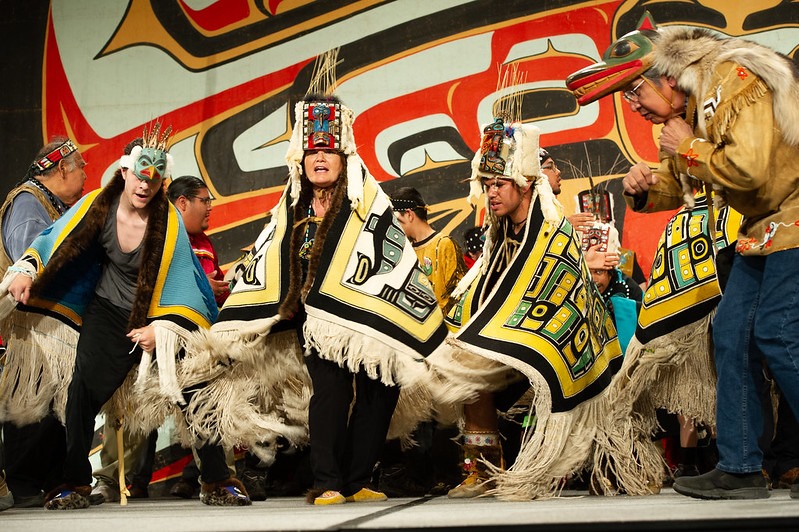
- Details
- By Jenna Kunze
- Sovereignty
PETERSBURG, Alaska — A municipality in Southeast Alaska on March 12 heard public comments on federal legislation that would allow five landless tribes in the area to form a corporation and be granted acreage within the Tongass National Forest.
The five Southeast communities — Haines, Ketchikan, Wrangell, Petersburg, and Tenakee — were not included in the landmark Alaska Native Native Claims Settlement Act (ANCSA), which divided 44 million acres of land among more than 200 regional, village, and urban corporations to resolve land claims throughout Alaska.
The Unrecognized Southeast Alaska Native Communities Recognition and Compensation Act, introduced by Alaska Sen. Lisa Murkowski in November, would amend ANCSA to provide each community with the right to form an Alaska Native Urban Corporation and receive 23,040 acres of federal land within the Tongass National Forest.
The bill was co-sponsored by Sen. Dan Sullivan and supported by Alaska Congressman Don Young.
“The identity of Alaska’s first people is inextricably tied to the land they have inhabited for centuries,” Murkowski said in a statement. “For five decades, these five landless communities have sought the same benefits ANCSA granted to other Alaska Natives throughout the Southeast. This is a matter of equity. Our new legislation will help correct this historical wrong.”
In November, Petersburg borough assembly asked the congressional delegation for more time to hear from community members on pros and cons of the bill before making a decision. Earlier this month, six people testified in a remote meeting, four in favor of the legislation and two against.
If the legislation is enacted, the new urban corporations, which have about 4,400 shareholders, would receive $2.5 million in grant funding to hold elections, establish a board of directors, and create a corporate infrastructure.
Opponents of the bill say that the tribes failed to meet eligibility criteria to form a Native corporation in the past, and that the new bill would create inequities.
“Their exclusion from village status was an informed consideration and an intentional determination under ANCSA,” bill opponent Becky Knight said. “Quite simply, they didn’t qualify as various agency officials have repeatedly written and testified before Congress regarding the very similar versions of this bill, including in 1996 and 2015.”
Alaska Natives Without Land, a coalition of affected community members dedicated to lobbying for the legislation, argues that each of the five landless communities have satisfied more ANCSA requirements than other communities that did receive land.
There is no consensus on why the five communities were left out of ANCSA, according to a statement from Sen. Murkowski’s office. A congressionally-directed 1994 study by the University of Alaska’s Institute of Social and Economic Research found that the examined history of the five communities showed strong similarities to other communities in the region that were granted corporations under ANCSA.
Another speaker at the hearing, Eric Lee, said the bill would create legal battles among other Native corporations over inequity.
“The most obvious and easy to understand is the creation of a Native Corporation in Tenakee, where six without land shareholders would receive 23,040 acres for their new corporation, the same amount of acreage as each of the other four without land, some with hundreds of shareholders,” Lee said.
Todd Antioquia, a member of the Alaska Natives Without Land campaign, said that resource revenue sharing is distributed on a per shareholder basis to both village and urban corporations. “The difference is that the urban shareholders receive those benefits directly,” he said.
“Tenakee Springs has 132 enrolled landless shareholders, and there are many other villages throughout Alaska of the 200 villages that have enjoyed having their own corporations in these last 50 years that have fewer shareholders than Tenakee,” he said.
Proponents for the bill said a new corporation could help the economy, and that the bill’s lobbyists have modified the bill countless times to satisfy opponents’ feedback.
“The Tlingit Haida and Tsimshian used to roam all 23 million acres of Southeast Alaska, including the 17 million acres of what became the Tongass National Forest in 1908 without tribal consultation,” said Nicole Hallingstad, a Petersburg local who also sits on the board of the regional corporation Sealaska, which backs the legislation. “A bill transferring land to these five landless communities would return 0.5 percent of those Indigenous homelands. This is important to remember, and I’ll say it again: 0.5 percent. It’s half of 1 percent of the Tongass.”
Hallingstad added that a new corporation in town would mean new jobs “with an employment base as diverse as the community” and new industries including aquaculture, “low-impact tourism,” carbon capture, contracting and joint venture partnerships.
Will Ware, a Petersburg local and longtime proponent of the bill, said that people who oppose it are simply repeating false narratives. Resistance to past legislation has come from recreational users concerned about losing access to the land, and specific local concerns including two recreational-use cabins in potentially conveyed plots of land.
“This Landless Coalition has been engaged in this fight for 50 years. We presented maps, had discussions, made public what our intentions are. There’s nothing that has been done rushed or planned behind closed doors,” Ware said. “To have my colleagues here to continue to answer the same questions over and over is feeling as though you are either not liking or hearing our answers, or you believe we're being dishonest.”
Ware clarified that the bill is not a logging bill, and public access will continue and be legally protected within the bill.
“I have to say that I believe those who keep saying there are questions that need answering are being somewhat disingenuous,” Ware said. “We have answered your questions, we have modified our selections, we have done everything within reason to accommodate each and every concern.”
